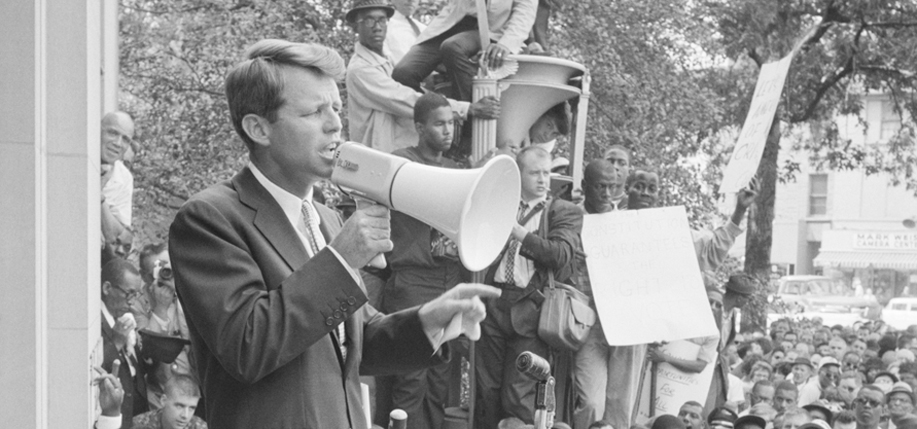The seeds of Robert F. Kennedy’s compassion lay in his understanding of the past struggles of his Irish ancestors.
On March 17, 1964, Robert F. Kennedy traveled to Scranton, Pennsylvania, to address the Friendly Sons of St. Patrick. His address that evening was rich in purpose but also in sentiment. It was his first speech since Dallas.
He had chosen this Irish American audience in this most Irish of cities to share what lay so deep in his heart: his love for his lost brother Jack and his commitment to his legacy.
He began with a tribute to the legacy he and his audience shared: the mid-19th century famine that had caused their ancestors to cross what John Boyle Reilly would call “the bowl of tears” and the prejudice that met their families here in this country.
Bobby spoke of the NO IRISH NEED APPLY signs that were then all too common in the windows of Boston shops and the Yankee social prejudice that drove even the well-off Kennedys to forsake it for New York.
“Our forefathers were subject to every discrimination found wherever discrimination is known,” he reminded the prominent men of Scranton before him in the black tie event.
He asked that they join him in pushing for the landmark civil rights then before the Congress.
He wanted them to show the same passion for ending segregation in the South as they still felt for the past injustice done to their own families.
This concern for minorities had become Bobby’s mission in the early 1960s. It would be his vocation. There were the fights to open up the University of Mississippi, then that of Alabama. He’d ordered in federal troops to protect student James Meredith at Ole Miss, then pushed Governor George Wallace aside on the campus of Tuscumbia.
By 1963, even before his brother was killed, R.F.K. was championing the concerns of Native Americans. After Dallas, he became a partner with Caesar Chavez in demanding rights for Mexican Americans, then for the desperately poor in the Mississippi Delta.
All the time, Bobby continued to parallel the earlier obstacles facing the Irish in this country with these other communities. He felt it gave him credibility. More important, it gave him empathy for the basic reason that he never lost his inherited memory of being rejected, of being overlooked.
His respect for human dignity was something he put into practice on a daily basis. I remember hearing when I first came to work in Washington how Senator Robert Kennedy was the lone Democratic liberal who regularly greeted the Capitol Police officers on duty.
The great New York columnist Jack Newfield noticed this aspect of Bobby Kennedy. What made R.F.K. unique, Newfield wrote “was that he felt the same empathy for white working men and women that he felt for blacks, Latinos, and Native Americans. He thought of cops, waitresses, construction workers, and firefighters as his people.”
Bobby knew this set him apart. On the same night in Los Angeles he was shot, he took hope from what Newfield had noted about him.
“I have an association with those who are less well off, where perhaps we can accomplish something,” he told a reporter interviewing him, “bringing the country back together. If the division continues, we’re going to have nothing but chaos and havoc here in the United States.”
So what was it?
What gave this man born to wealth this instinct for the overlooked, this empathy for people cast aside?
I believe it was largely what he would often say it was: his Irishness. He carried with him that memory of a people repressed in their native land, a million of them starved to death, more than that forced to emigrate to America.
I cannot forget the role of his religion. He thought it unjust that Dr. Martin Luther King was thrown into prison in the fall of 1960 for what was no more than a traffic violation. He believed it was unjust to deny California farm workers the basic rights of Americans. He saw it as “unacceptable,” a word he used often, when he came across a young boy in the Mississippi Delta forced to survive on a diet of molasses.
Robert Lowell once noted how “unassimilated” Bobby Kennedy was, that he’d never quite given up the personality of the Irishman just off the boat, just arrived from the land of famine and British repression.
I think Lowell got it right.
Still hurting and morally tested by the death of his beloved Jack, he began his remarks in Scranton with an account of how a young Queen Victoria, hearing that 15,000 Irish men and women were dying each day due to the famine, “was so overwhelmed with pity that she offered the sum of five pounds for the Society of Irish Relief.”
Yes, you can hear the attitude in his words, the sarcasm, but with it the quiet, contemptuous, irreverent call for justice.
You can hear the Irish in Bobby, the Irish he never lost. ♦
Chris Matthews is the author of Bobby Kennedy: A Raging Spirit. He is the former host of MSNBC’s Hardball, and a member of the Irish America Hall of Fame.
For more on the Kennedys read:
Our Jack by Pete Hamill recalls November 22, 1963. Hamill was in Belfast with his father visiting family when he heard the news about JFK.
Bobby Kennedy Has Been Turned into an Impossibly Perfect Hero by Brian Dooley.


Thank you. I’d never listened to Robert’s voice before. Those long Boston A’s!
Tagus dut.
Peadar
When Bobby Kennedy made this speech to the Friendly Sons on 17 March, 1964, I had been honorably discharged from the Marine Corps less than a week. During the 4 years I served, President J.F.K. was my Commander-in-Chief for 3 years and 10 months. Jack was always my favorite one of the Kennedys.